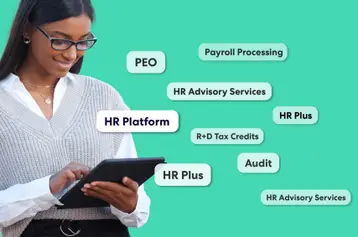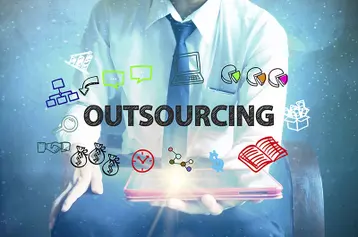
Table of contents
- 1.Unlock Your Growth Potential with a Professional Employer Organization
- 2.Your guide to PEOs
- 3.How can outsourced HR work for me?
- 4.Advantages of a PEO
- 5.PEOs Save time
- 6.Access big-company benefits
- 7.Attract and retain top talent
- 8.Monetary savings
- 9.HR expertise
- 10.Risk mitigation
- 11.How to choose the right PEO
- 12.Find an established and Certified PEO.
- 13.Get client references.
- 14.Look for quality benefits and packages.
- 15.Ensure relevant expertise.
- 16.Know the charged rates.
- 17.Figure out transition time.
- 18.Determine how much support is provided.
- 19.Common questions about partnering with a PEO
- 20.Will I lose control over my employees?
- 21.Why do I need a PEO if I already have an HR manager?
- 22.Is my business too small to hire a PEO?
- 23.Is a PEO a staffing agency?
A professional employer organization (PEO) is an organization that provides comprehensive human resources services for small and medium-size businesses. PEOs process and pay employee wages and employment taxes and provide HR regulation compliance guidance. Businesses turn to PEOs as a way to help outsource their HR.
Unlock Your Growth Potential with a Professional Employer Organization
Your guide to PEOs
As today’s business evolves, so does the role of outsourced HR and the professional employer organization (PEO). So what is a PEO? Over the years, small to medium businesses partnered with PEOs to access HR outsourcing services, including payroll processing, benefit options, HR expertise and tax administration. Today, PEOs play a strategic role in growth for small and medium size businesses.
How can outsourced HR work for me?
PEOs operate under a co-employment model in which the PEO, as a co-employer, is the employer of record for tax purposes and is responsible for collecting and remitting payroll taxes for employees on its platform. The client maintains control over workforce decisions, like hiring, firing, compensation and culture.
Advantages of a PEO
PEOs Save time
A professional employer organization (PEO) can provide technology, processes and HR professionals, freeing up time for employers to focus on their core business.
Access big-company benefits
PEO companies can offer access to a variety of large group health insurance benefits that otherwise may not be available to small businesses including access to retirement plans and pet insurance.
Attract and retain top talent
PEOs create a more engaged workforce. Research shows that employee turnover is 10 to 14% lower for PEO clients compared to other small businesses not using a PEO.1
Monetary savings
A study conducted by the PEO trade association indicated that annual administrative costs are around $450 lower per employee for businesses that use a PEO.2
HR expertise
Professional employment groups often have experts who guide clients on important and technical topics including employee relations, company benefits strategy or developing an employment handbook.
Risk mitigation
The PEO has a vested interest in the risk and responsibility associated with employing a client’s employees. Some also deliver guidance, administration and reference resources to support compliance.
How to choose the right PEO
Arm yourself with knowledge and select the right PEO partner that makes both business and financial sense to your company.
Find an established and Certified PEO.
Choose a PEO that has a demonstrated history and financial strength. Select PEOs are accredited by the Employer Services Assurance Corporation (ESAC) or the Internal Revenue Service (IRS) that qualifies PEOs as a Certified Professional Employer Organization (CPEO).
Get client references.
Ask the PEO for references with similar size, industry and geographical location. You should also reach out to your personal and professional network for candid feedback.
Look for quality benefits and packages.
The right PEO for your business should offer quality health care coverage in your geographical areas, as well as benefits that are most relevant to your industry.
Ensure relevant expertise.
Investigate the PEO’s core offerings and whether they align with your business’ size and industry. Make sure the PEO is certified and experienced in each of the states in which you operate.
Know the charged rates.
PEOs generally charge their clients either a flat rate per employee or percentage of payroll. The flat rate is a fee for every employee whereas the percentage of payroll is based on the amount of each paycheck processed.
Figure out transition time.
Ask about the set-up process. How much paperwork will it entail? Is the process mostly completed online? How much hassle will you have to go through during the transition?
Determine how much support is provided.
Your PEO partner should have a strong system in place to answer questions, as well as expert resources to deliver strategic guidance. Does the PEO provide multiple points of access such as phone, email and chat? What is the PEO’s consulting capability?
Common questions about partnering with a PEO
Look past the common misconceptions about a PEO to see how it can help you meet the demands of HR and give precious time back to your business.
Will I lose control over my employees?
As the client and employer, you will continue to run your day-to-day business, manage your employees and set goals and performance metrics. The PEO’s responsibility is to help with the items outlined in your relationship such as, payroll or access to benefits.
Why do I need a PEO if I already have an HR manager?
A PEO does not need to replace your HR manager. Instead, it helps to decrease time spent on administrative tasks so that your HR manager can focus on strategic initiatives like culture, performance management and recruiting.
Is my business too small to hire a PEO?
A PEO can add great value the moment a business hires its first employees. Partnering with a PEO delivers access to robust health care benefits that would otherwise be out of reach for many small businesses. Additionally, a PEO can help navigate small businesses through complex HR regulations.
Is a PEO a staffing agency?
No. A PEO operates under a co-employment model for the purposes of providing HR services and access to insurance. Unlike staffing firms, the client retains its own employment relationship.
1Bassi, Laurie. McMurrer, Dan, September 2014, “Professional Employer Organizations: Keeping Turnover Low and Survival High,”: quoted in Bassi, Laurie and McMurrer, Dan, September 2017, “PEOs: Good for Businesses and Their Employees” NAPEO White Paper Series at https://www.napeo.org/docs/default-source/white-papers/2017-napeo-white-paper-final.pdf?sfvrsn=2 (Accessed September 1, 2018)
2NAPEO White Papers website at https://www.napeo.org/what-is-a-peo/about-the-peo-industry/napeo-white-papers/overview (Accessed September 1, 2018).

TriNet Team
Table of contents
- 1.Unlock Your Growth Potential with a Professional Employer Organization
- 2.Your guide to PEOs
- 3.How can outsourced HR work for me?
- 4.Advantages of a PEO
- 5.PEOs Save time
- 6.Access big-company benefits
- 7.Attract and retain top talent
- 8.Monetary savings
- 9.HR expertise
- 10.Risk mitigation
- 11.How to choose the right PEO
- 12.Find an established and Certified PEO.
- 13.Get client references.
- 14.Look for quality benefits and packages.
- 15.Ensure relevant expertise.
- 16.Know the charged rates.
- 17.Figure out transition time.
- 18.Determine how much support is provided.
- 19.Common questions about partnering with a PEO
- 20.Will I lose control over my employees?
- 21.Why do I need a PEO if I already have an HR manager?
- 22.Is my business too small to hire a PEO?
- 23.Is a PEO a staffing agency?






